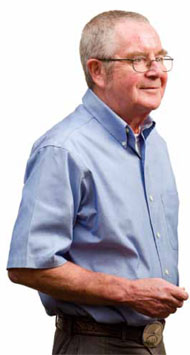Five for Jerry Hall
 Editor’s Note: In “Five for…” a new article format, we ask professors to answer five key questions about their careers and experiences at the SOE.
Editor’s Note: In “Five for…” a new article format, we ask professors to answer five key questions about their careers and experiences at the SOE.
Jerry Hall, professor of civil engineering, has taught hundreds of SOE students about transportation engineering, highway design, traffic safety, and other engineering topics over the last 33 years. And as the department’s senior advisor for the past 20 years, he’s also helped oversee the path to graduation for all of the department’s undergraduate students.
Besides his teaching and advisory talents, Hall’s most important contribution to the SOE was his idea for creating a comprehensive, hands-on class for seniors that reflects the interdisciplinary nature of civil and construction engineering. In 1993, Hall spearheaded the development of the Capstone Design Course, where teams of seniors work with practicing professional engineers on real-world projects such as bridges, water treatment plants, and even New Mexico’s Spaceport.
Seventeen years later, more than 30 engineering firms and agencies have participated, and the Capstone Course is a highlight for students and professors alike. “It’s really opened students’ eyes to the fact that they have to work as a team because that’s the way they’ll have to work in the real world,” explains Hall. The Fall 2009 Capstone Course garnered a prestigious award from the National Council of Engineering Examiners for “engaging students in collaborative projects with professional licensed engineers.”
1. What’s a research highlight for you?
I worked with the Insurance Institute for Highway Safety to study accidents in New Mexico where single vehicles overturned. I sent teams of students to take engineering measurements at the sites of 150 fatal overturning crashes throughout the state. We documented that these crashes occurred more frequently on roadway sections with adverse alignment conditions on the approach to the crash site.
2. You teach an ethics class for engineering students. Why is that so important?
The engineering code of ethics requires all engineers to hold paramount the safety, health, and welfare of the public. However, the importance of ethical behavior and the consequences of unethical behavior are rarely addressed in standard engineering courses.
3. What’s brought you the most satisfaction in your career?
Seeing our students graduate… shaking their hands as they cross the stage and seeing their family’s celebration reinforces my efforts.
4. What is the greatest feat of modern civil engineering?
I think it’s our nation’s system of Interstate and Defense highways. It’s facilitated dramatic economic growth in the United States over the past 50 years.
5. What’s our society’s most important civil engineering challenge?
To me it’s the deterioration of our country’s infrastructure. Roads and water lines are wearing out, nearly a quarter of all the country’s bridges are functionally or structurally deficient,
and we don’t currently have the resources to address these problems.
